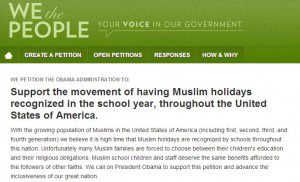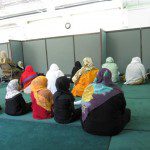 By Laila Alawa and Wardah Khalid
By Laila Alawa and Wardah Khalid
If you’re a part of the Muslim American community, you have probably heard of the cause recently heard ‘round the world: A petition, put together by three homeschooled Muslim middle school students in Virginia, asking the White House to have public schools recognize Muslim holidays. This is actually the second such petition to appear in the past several months, as the first failed to gather enough signatures to reach the White House. It reads as follows:
“With the growing population of Muslims in the United States of America (including first, second, third, and fourth generation) we believe it is high time that Muslim holidays are recognized by schools throughout this nation. Unfortunately many Muslim families are forced to choose between their children’s education and their religious obligations.”
“Muslim school children and staff deserve the same benefits afforded to the followers of other faiths. We call on President Obama to support this petition and advance the inclusiveness of our great nation.”
Supporters of the petition have pointed to school holidays given to Jewish children as evidence of the need for Muslim holidays as well. While this may be true, the fact is that these holidays are decided by local school boards, not the federal government. Frankly speaking, President Obama doesn’t have much to do with your neighbor getting Hanukkah off because it is not technically a federal holiday. If you live in an area where there are enough Muslim children to warrant a school holiday, then your school board, not the White House, should be petitioned.
A little political savvy couldn’t hurt, either. Democracy is a representative institution, but the proper channels must be utilized to make it effective. If everyone went straight to the top for their varying concerns, then it would be an autocracy, not a democracy. This absolutely goes for those Muslims who have argued that as American citizens, they have the right to petition the White House whenever they like and that there is no harm in trying to raise awareness. Yes, you are free to do that, but odds are White House officials will send you straight back to your local school board to raise awareness there.
The wording of the petition is also evidence of the sort of “victim mentality” that Muslims are often accused of having — the attitude that their civil, political and social rights are constantly infringed upon by “the system” due to their religion. While it is true that Muslims have been discriminated against in the past based on their faith, it does not mean that this is necessarily the reason why their holidays are being excluded from school calendars.
As Americans, we are afforded equal treatment under the law. However, it is sometimes up to us to enforce that equality. Jewish parents no doubt spoke to their school boards before their children were given holidays. Muslims will simply have to do the same. If, after pursuing that option, their requests are ignored, then it would make sense to bring it to the attention of those higher up in the system.
Let’s be real. We have a ways to go as a community before things like a national holiday can be requested and subsequently fulfilled. It isn’t because we are a young community. Rather, we as Muslim Americans are simply not involved enough. We have to become educated about the political process and hold ourselves accountable to the responsibilities and role our Prophet Muhammad (peace and blessings be upon him) placed upon us: To be contributing citizens to the society we are a part of.
Thus, it is our inherent religious duty to get involved with the entire political process — not simply through signing a quick petition, but through voting, expressing our needs and desires to our representatives, running for office and giving back to the greater American diaspora. And this should not necessarily be Muslim-specific issues, either. If we want to enjoy the right to petition due to our citizenship and tax contributions, we must accept the responsibility that comes with it.
There’s a saying that goes, “If you aren’t at the table, you are on the table.” As Muslim Americans, we are still for the most part being served up on the table. It’s up to us to make sure that we begin taking our place at the table — for more than simply school holidays. Stand up and get involved: America is your community, too.
Wardah Khalid is the author of the Young American Muslim blog on the Houston Chronicle and HuffPost. She is currently studying International Affairs in New York and can be followed on Twitter @YAmericanMuslim.
Laila Alawa is a Muslim feminist, writer and cultural critic who has been published at The Huffington Post, The Guardian, and ILLUMEMedia, and serves as the founder and editor of Coming of Faith. She conducted a study on Muslim American perceptions of belonging, and is based in Washington, DC.
Follow Wardah Khalid on Twitter @YAmericanMuslim and Laila Alawa @Lulainlife. A version of this piece originally appeared on Huffington Post.












